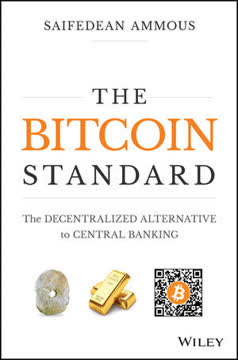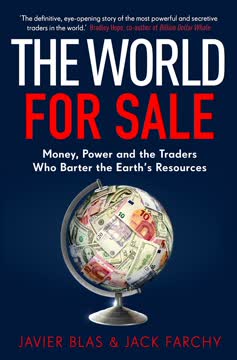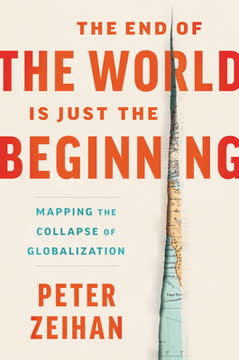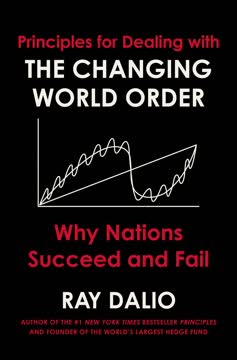ข้อสำคัญ
1. วัฏจักรใหญ่: อาณาจักรเกิดขึ้นและล่มสลายในรูปแบบที่คาดการณ์ได้
“ทุกสิ่งที่เกิดขึ้นแล้วและจะเกิดขึ้น ล้วนมีปัจจัยกำหนดที่ทำให้มันเกิดขึ้น”
กรอบแนวคิดวัฏจักรใหญ่ อธิบายการขึ้นและลงของอาณาจักรต่าง ๆ ตลอดประวัติศาสตร์ วัฏจักรนี้มักดำเนินไปในช่วงเวลาประมาณ 250 ปี (บวกหรือลบ 150 ปี) โดยแบ่งออกเป็นหลายช่วง ได้แก่
- การขึ้น: ระเบียบใหม่เริ่มต้นด้วยผู้นำและสถาบันที่เข้มแข็ง
- จุดสูงสุด: อาณาจักรถึงจุดสูงสุดของความมั่งคั่งและอำนาจ
- การเสื่อมถอย: เกิดความขัดแย้งภายในและความท้าทายจากภายนอก
- วิกฤต: ความกดดันทางเศรษฐกิจ สังคม และการเมืองสะสมจนถึงจุดสูงสุด
- ภาวะซึมเศร้า/ปฏิวัติ/สงคราม: ระเบียบเก่าล่มสลาย
- ระเบียบใหม่: วัฏจักรใหม่เริ่มต้นด้วยระบบที่ได้รับการปรับโครงสร้าง
ปัจจัยสำคัญที่ขับเคลื่อนวัฏจักรนี้ ได้แก่
- ความแข็งแกร่งทางเศรษฐกิจและผลิตภาพ
- นวัตกรรมทางเทคโนโลยีและการศึกษา
- กำลังทหารและอิทธิพลระดับโลก
- ระดับหนี้สินและเสถียรภาพทางการเงิน
- ความสามัคคีทางสังคมและการกระจายความมั่งคั่ง
2. เงิน เครดิต และหนี้สิน ขับเคลื่อนวัฏจักรเศรษฐกิจและการเปลี่ยนแปลงอำนาจ
“ถ้าคุณไม่เข้าใจว่าเงินและเครดิตทำงานอย่างไร คุณก็ไม่สามารถเข้าใจระบบนี้ได้ และถ้าไม่เข้าใจระบบ คุณก็ไม่อาจคาดการณ์สิ่งที่จะเกิดขึ้นกับคุณได้”
วัฏจักรหนี้มีบทบาทสำคัญในการกำหนดทิศทางเศรษฐกิจและอำนาจ วัฏจักรนี้แบ่งเป็นสองส่วนหลัก
-
วัฏจักรหนี้ระยะสั้น (5-8 ปี):
- ขยายตัว: เครดิตง่ายนำไปสู่การเติบโตทางเศรษฐกิจ
- หดตัว: เครดิตเข้มงวดทำให้เกิดภาวะถดถอย
-
วัฏจักรหนี้ระยะยาว (75-100 ปี):
- การสะสมหนี้ในระยะยาว
- ฟองสบู่หนี้และวิกฤตที่ตามมา
- การลดหนี้และการปรับโครงสร้างเศรษฐกิจ
ความเข้าใจวัฏจักรเหล่านี้ช่วยให้สามารถทำนายได้ว่า
- เศรษฐกิจจะรุ่งเรืองหรือถดถอย
- แนวโน้มเงินเฟ้อและเงินฝืด
- มูลค่าของสกุลเงินและอัตราแลกเปลี่ยน
- การเปลี่ยนแปลงอำนาจทางเศรษฐกิจโลก
3. ระเบียบและความวุ่นวายภายในกำหนดทิศทางของชาติ
“วิธีที่ผู้คนปฏิบัติต่อกันคือปัจจัยหลักที่กำหนดผลลัพธ์ที่พวกเขาได้รับ”
ความมั่นคงภายในเป็นกุญแจสำคัญสู่ความสำเร็จและความยั่งยืนของชาติ วัฏจักรของระเบียบและความวุ่นวายภายในมักผ่านขั้นตอนดังนี้
- ผู้นำที่เข้มแข็งรวบรวมอำนาจ
- สถาบันที่มีประสิทธิภาพถูกสร้างขึ้น
- สันติภาพและความเจริญรุ่งเรืองเบ่งบาน
- การใช้จ่ายและหนี้สินเกินพอดีสะสม
- ช่องว่างความมั่งคั่งขยายตัว นำไปสู่ความตึงเครียดทางสังคม
- ความขัดแย้งภายในทวีความรุนแรง อาจนำไปสู่สงครามกลางเมือง
ปัจจัยที่มีผลต่อระเบียบภายใน ได้แก่
- คุณภาพของผู้นำและการบริหาร
- ความเข้มแข็งของสถาบันและกฎหมาย
- โอกาสทางเศรษฐกิจและการเคลื่อนย้ายทางสังคม
- การกระจายความมั่งคั่งและความสามัคคีทางสังคม
- การศึกษาและค่านิยมร่วมกัน
4. ความขัดแย้งภายนอกและภูมิรัฐศาสตร์มีอิทธิพลต่อสมดุลอำนาจโลก
“ทุกประเทศในประวัติศาสตร์ต่างมีระบบหรือระเบียบในการจัดการความสัมพันธ์ระหว่างกัน”
ความสัมพันธ์ทางภูมิรัฐศาสตร์กำหนดสมดุลอำนาจโลก ปัจจัยสำคัญของระเบียบและความวุ่นวายภายนอก ได้แก่
- การสร้างพันธมิตรและความเป็นศัตรู
- ความสัมพันธ์ทางเศรษฐกิจและการค้า
- ความขัดแย้งทางทหารและการแข่งขันอาวุธ
- การเจรจาทางการทูตและสนธิสัญญา
- การแย่งชิงทรัพยากรและอิทธิพล
ประเภทของความขัดแย้งระหว่างประเทศ ได้แก่
- สงครามการค้า/เศรษฐกิจ
- สงครามเทคโนโลยี
- สงครามภูมิรัฐศาสตร์
- สงครามทุน
- สงครามทางทหาร
ความเข้าใจในพลวัตเหล่านี้ช่วยทำนายการเปลี่ยนแปลงอำนาจโลกและพื้นที่ที่อาจเกิดความขัดแย้ง
5. การศึกษา นวัตกรรม และการแข่งขันเป็นแรงขับเคลื่อนความสำเร็จของชาติ
“ผลิตภาพของมนุษย์คือแรงขับเคลื่อนสำคัญที่สุดที่ทำให้ความมั่งคั่ง อำนาจ และมาตรฐานชีวิตของโลกเพิ่มขึ้นตามกาลเวลา”
การพัฒนาทุนมนุษย์เป็นกุญแจสำคัญสู่ความสำเร็จระยะยาวของชาติ ปัจจัยสำคัญได้แก่
- คุณภาพและการเข้าถึงระบบการศึกษา
- การลงทุนในงานวิจัยและพัฒนา
- วัฒนธรรมและการสนับสนุนผู้ประกอบการ
- นวัตกรรมและการนำเทคโนโลยีมาใช้
- ทักษะและความสามารถในการปรับตัวของแรงงาน
ประโยชน์ของทุนมนุษย์ที่แข็งแกร่ง ได้แก่
- ผลิตภาพทางเศรษฐกิจที่เพิ่มขึ้น
- มาตรฐานชีวิตที่สูงขึ้น
- ความสามารถในการแข่งขันระดับโลกที่มากขึ้น
- ความสามารถในการแก้ปัญหาสังคมที่ดีขึ้น
- ความยืดหยุ่นต่อการเปลี่ยนแปลง
ประเทศที่ให้ความสำคัญกับด้านเหล่านี้มักจะก้าวขึ้นสู่อำนาจโลกและรักษาตำแหน่งได้ยาวนาน
6. ช่องว่างความมั่งคั่งและความไม่สงบทางสังคมเป็นสัญญาณก่อนการเปลี่ยนแปลงอำนาจครั้งใหญ่
“ตลอดประวัติศาสตร์ กลุ่มคนต่าง ๆ เช่น ชนเผ่า ราชอาณาจักร หรือประเทศ ได้รับความมั่งคั่งและอำนาจโดยการสร้างขึ้นเอง การยึดจากผู้อื่น หรือการค้นพบในแหล่งทรัพยากร”
ความไม่เท่าเทียมทางความมั่งคั่งมักนำไปสู่ความไม่มั่นคงทางสังคมและการเมือง ลำดับเหตุการณ์ทั่วไปคือ
- การเติบโตทางเศรษฐกิจเป็นประโยชน์ต่อชนชั้นนำกลุ่มเล็ก
- ช่องว่างความมั่งคั่งขยายตัวตามเวลา
- ความตึงเครียดทางสังคมเพิ่มขึ้น
- ขบวนการประชานิยมได้รับความนิยม
- ความแตกแยกทางการเมืองรุนแรงขึ้น
- มีโอกาสเกิดการปฏิวัติหรือการปฏิรูปครั้งใหญ่
ปัจจัยที่ส่งผลต่อช่องว่างความมั่งคั่ง ได้แก่
- การเข้าถึงการศึกษาและโอกาสที่ไม่เท่าเทียม
- การเปลี่ยนแปลงเทคโนโลยีที่กระทบตลาดแรงงาน
- โลกาภิวัตน์และการจ้างงานนอกประเทศ
- นโยบายภาษีที่เอื้อประโยชน์ต่อทุนมากกว่าค่าแรง
- การรวมศูนย์อำนาจของบริษัทขนาดใหญ่
การแก้ไขความไม่เท่าเทียมทางความมั่งคั่งเป็นสิ่งจำเป็นเพื่อรักษาความมั่นคงทางสังคมและป้องกันความขัดแย้งที่รุนแรง
7. สถานะสกุลเงินสำรองนำมาซึ่งทั้งสิทธิพิเศษและความเปราะบาง
“การมีสกุลเงินสำรองเป็นเรื่องดีในช่วงเวลาหนึ่ง เพราะทำให้ประเทศนั้นมีอำนาจในการกู้ยืมและใช้จ่ายอย่างโดดเด่น รวมถึงอำนาจสำคัญในการกำหนดว่าใครในโลกจะได้รับเงินและเครดิตสำหรับการซื้อขายระหว่างประเทศ”
พลวัตของสกุลเงินสำรองมีบทบาทสำคัญในอำนาจทางเศรษฐกิจโลก ข้อดีและความเสี่ยงได้แก่
ข้อดี
- ต้นทุนการกู้ยืมต่ำสำหรับประเทศผู้ออกสกุลเงิน
- ความต้องการสกุลเงินและหนี้สินในระดับโลกสูง
- สามารถขาดดุลการค้าได้มากขึ้น
- อิทธิพลทางภูมิรัฐศาสตร์ผ่านระบบการเงิน
ความเสี่ยง
- ความกดดันในการรักษาความเชื่อมั่นระดับโลกในสกุลเงิน
- ความเสี่ยงจากการสะสมหนี้สินเกินพอดี
- เปราะบางต่อการเปลี่ยนแปลงทัศนคติของโลก
- ความเสี่ยงที่จะสูญเสียสถานะสกุลเงินสำรองในที่สุด
สกุลเงินสำรองในประวัติศาสตร์ ได้แก่
- กิลเดอร์ดัตช์
- ปอนด์สเตอร์ลิงอังกฤษ
- ดอลลาร์สหรัฐ
ความเข้าใจพลวัตเหล่านี้ช่วยทำนายการเปลี่ยนแปลงอำนาจทางเศรษฐกิจโลกและมูลค่าสกุลเงิน
8. การแข่งขันระหว่างสหรัฐฯ กับจีนสะท้อนการเปลี่ยนแปลงอำนาจในประวัติศาสตร์
“ระเบียบโลกกำลังเปลี่ยนแปลงอย่างรวดเร็วในรูปแบบที่ไม่เคยเกิดขึ้นในช่วงชีวิตของเรา แต่เคยเกิดขึ้นหลายครั้งในอดีต”
ความสัมพันธ์ระหว่างสหรัฐฯ กับจีนในปัจจุบันสะท้อนรูปแบบของอำนาจที่กำลังขึ้นและอำนาจที่มั่นคงอยู่แล้ว ปัจจัยสำคัญของการแข่งขันนี้ได้แก่
-
การแข่งขันทางเศรษฐกิจ:
- ข้อพิพาททางการค้า
- การแข่งขันด้านเทคโนโลยี
- ตลาดเงินตราและทุน
-
ความตึงเครียดทางภูมิรัฐศาสตร์:
- ข้อพิพาทดินแดน (เช่น ทะเลจีนใต้ ไต้หวัน)
- การแย่งชิงอิทธิพลในภูมิภาค
- การพัฒนากำลังทหารและการแสดงอำนาจ
-
ความแตกต่างทางอุดมการณ์:
- ระบบการเมือง (ประชาธิปไตยกับทุนนิยมรัฐ)
- สิทธิมนุษยชนและปรัชญาการปกครอง
- วิสัยทัศน์การปกครองโลก
ตัวอย่างในประวัติศาสตร์ที่คล้ายคลึงกัน ได้แก่
- เอเธนส์และสปาร์ตาในกรีกโบราณ
- อังกฤษและเยอรมนีก่อนสงครามโลกครั้งที่ 1
- สหรัฐฯ และสหภาพโซเวียตในยุคสงครามเย็น
ความเข้าใจพลวัตเหล่านี้ช่วยให้คาดการณ์พื้นที่ที่อาจเกิดความขัดแย้งและความร่วมมือระหว่างสองมหาอำนาจนี้ได้
9. กลยุทธ์การลงทุนต้องปรับตัวตามวัฏจักรเศรษฐกิจระยะยาว
“ตลาดทั้งหมดถูกขับเคลื่อนโดยปัจจัยหลักเพียงสี่อย่าง คือ การเติบโต เงินเฟ้อ เบี้ยความเสี่ยง และอัตราคิดลด”
ผลกระทบของวัฏจักรเศรษฐกิจระยะยาวต่อการลงทุนมีความสำคัญ ปัจจัยที่ควรพิจารณา ได้แก่
-
การจัดสรรสินทรัพย์:
- กระจายการลงทุนในหลายประเทศ สกุลเงิน และประเภทสินทรัพย์
- พิจารณาช่วงของวัฏจักรหนี้ก่อนตัดสินใจ
- ปรับตัวตามภูมิทัศน์เศรษฐกิจและภูมิรัฐศาสตร์ที่เปลี่ยนแปลง
-
ความเสี่ยงด้านสกุลเงิน:
- ตระหนักถึงความเสี่ยงจากการลดค่าของสกุลเงิน
- พิจารณาทองคำและสินทรัพย์ที่จับต้องได้เป็นเครื่องป้องกันความเสี่ยง
-
ระดับหนี้สิน:
- ติดตามระดับหนี้ของรัฐบาลและภาคเอกชน
- ระมัดระวังการใช้เลเวอเรจเกินพอดีในระบบ
-
การเปลี่ยนแปลงทางเทคโนโลยี:
- ลงทุนในภาคส่วนและบริษัทที่ขับเคลื่อนนวัตกรรม
- ระวังอุตสาหกรรมที่เสี่ยงต่อการถูกแทนที่ด้วยเทคโนโลยีใหม่
-
ความเสี่ยงทางภูมิรัฐศาสตร์:
- พิจารณาผลกระทบจากความตึงเครียดทางการค้าและความขัดแย้ง
- กระจายการลงทุนในภูมิภาคที่มีความเสี่ยงแตกต่างกัน
ด้วยความเข้าใจวัฏจักรระยะยาว นักลงทุนจะสามารถวางตำแหน่งตนเองได้ดียิ่งขึ้นสำหรับการเปลี่ยนแปลงทางเศรษฐกิจและตลาดในอนาคต
10. ระเบียบโลกในอนาคตจะถูกกำหนดโดยแนวโน้มโลกปัจจุบัน
“เพื่อให้เกิดสันติภาพและความเจริญรุ่งเรือง สังคมต้องมีผลิตภาพที่เป็นประโยชน์ต่อคนส่วนใหญ่”
แนวโน้มโลกที่กำลังเกิดขึ้นจะส่งผลต่อระเบียบโลกในอนาคต ปัจจัยสำคัญที่ควรจับตามอง ได้แก่
-
ความก้าวหน้าทางเทคโนโลยี:
- ปัญญาประดิษฐ์และระบบอัตโนมัติ
- เทคโนโลยีชีวภาพและนวัตกรรมด้านสุขภาพ
- พลังงานสะอาดและโซลูชันความยั่งยืน
-
การเปลี่ยนแปลงทางประชากร:
- ประชากรสูงวัยในประเทศพัฒนาแล้ว
- กลุ่มชนชั้นกลางที่เพิ่มขึ้นในตลาดเกิดใหม่
- รูปแบบการย้ายถิ่นและการขยายตัวของเมือง
-
การเปลี่ยนแปลงสภาพภูมิอากาศ:
- ผลกระทบต่อเศรษฐกิจและสิ่งแวดล้อม
- การเปลี่ยนผ่านสู่พลังงานที่ยั่งยืน
- ความเป็นไปได้ของความขัดแย้งที่เกิดจากทรัพยากร
-
การพัฒนาสถาบันโลก:
- การปฏิรูปองค์กรระหว่างประเทศ
- การสร้างพันธมิตรและกลุ่มเศรษฐกิจใหม่
- การเปลี่ยนแปลงรูปแบบการปกครองโลก
-
การเปลี่ยนแปลงทางวัฒนธรรมและสังคม:
- รูปแบบการทำงานที่เปลี่ยนไป (เช่น การทำงานระยะไกล)
- ความเปลี่ยนแปลงในพฤติกรรมผู้บริโภค
- การเปลี่ยนแปลงค่านิยมและลำดับความสำคัญของสังคม
การเข้าใจแนวโน้มเหล่านี้จะช่วยให้บุคคล ธุรกิจ และผู้กำหนดนโยบายเตรียมพร้อมและมีส่วนร่วมในการกำหนดระเบียบโลกในอนาคตได้อย่างมีประสิทธิภาพ
อัปเดตล่าสุด:
FAQ
What's Principles for Dealing with the Changing World Order about?
- Historical Cycles: The book examines the rise and fall of empires, focusing on the cyclical nature of wealth and power dynamics. It highlights how these cycles are driven by universal principles.
- Big Cycle Framework: Ray Dalio introduces the "Big Cycle," which includes economic, political, and social factors influencing the rise and fall of nations.
- Current Global Dynamics: The book discusses contemporary geopolitical tensions, especially between the US and China, and how these dynamics may evolve.
Why should I read Principles for Dealing with the Changing World Order?
- Timely Insights: Given current global uncertainties, Dalio's analysis offers valuable perspectives on anticipating and responding to significant changes.
- Practical Application: The book provides actionable advice based on historical precedents, applicable to personal and professional life, especially in investment and economic decision-making.
- Expertise of the Author: Ray Dalio's experience as a successful investor lends credibility to his analysis, making it a valuable resource for understanding global macroeconomic trends.
What are the key takeaways of Principles for Dealing with the Changing World Order?
- Cycles of Rise and Decline: All empires experience cycles of growth and decay, influenced by economic, political, and social factors. Recognizing these cycles can help predict future trends.
- Importance of Adaptability: Nations and individuals must adapt to changing circumstances, with flexibility and a willingness to learn from history being crucial for success.
- Wealth and Power Dynamics: The book highlights how wealth and power concentration among a small elite can lead to societal tensions, emphasizing the need to address these disparities.
What are the best quotes from Principles for Dealing with the Changing World Order and what do they mean?
- "The times ahead will be radically different from those we’ve experienced in our lifetimes.": This quote underscores the inevitability of change and the importance of preparing for it.
- "Understanding history in this way also raises questions whose answers provide us with valuable clues on what the future will be like.": It emphasizes the value of historical study in informing present and future decisions.
- "The biggest thing affecting most people in most countries through time is the struggle to make, take, and distribute wealth and power.": This encapsulates the central theme of the book, highlighting the ongoing conflict over resources.
What is the "Big Cycle" as defined in Principles for Dealing with the Changing World Order?
- Definition of Big Cycle: The "Big Cycle" refers to recurring patterns of rise and decline that nations experience over time, encompassing economic, political, and social factors.
- Stages of the Cycle: Dalio outlines stages such as the rise of new leadership, periods of prosperity, and eventual decline due to internal and external pressures.
- Historical Examples: The book provides examples of empires like the Dutch, British, and American, illustrating how they followed similar patterns.
How does Ray Dalio define the long-term debt cycle in Principles for Dealing with the Changing World Order?
- Definition of the Cycle: The long-term debt cycle lasts 50 to 75 years and involves debt accumulation leading to a crisis, with stages including initial prosperity and eventual defaults.
- Stages of the Cycle: Dalio outlines six stages, from low debt and hard money to increased borrowing and crises, reflecting economic conditions and responses.
- Impact on Economies: This cycle affects both individual nations and the global economy, helping anticipate economic downturns and necessary adjustments.
How does Principles for Dealing with the Changing World Order explain the decline of empires?
- Common Themes in Decline: Dalio identifies themes like growing inequality, fiscal problems, and internal conflict, often leading to civil unrest and revolutions.
- Economic Mismanagement: Empires often face economic mismanagement, leading to excessive debt and inflation, eroding public trust and destabilizing politics.
- External Pressures: External pressures, such as military conflicts and competition from rising powers, can accelerate an empire's decline.
What are the implications of the US-China relationship discussed in Principles for Dealing with the Changing World Order?
- Rising Tensions: The book highlights increasing tensions between the US and China in trade, technology, and military domains as part of a broader struggle for dominance.
- Potential for Conflict: Dalio warns that competition could lead to military conflict, especially over issues like Taiwan, emphasizing careful management of differences.
- Global Impact: The US-China relationship affects global trade, economics, and geopolitics, making understanding it essential for anticipating future developments.
How does Principles for Dealing with the Changing World Order address the concept of monetary systems?
- Types of Monetary Systems: Dalio discusses hard currency, commodity-backed currency, and fiat currency, each with implications for economic stability and growth.
- Historical Patterns: The book outlines transitions between these systems throughout history, often leading to inflation and economic crises.
- China's Monetary Evolution: Dalio highlights China's historical experiences with monetary systems, informing current Chinese monetary policy and global finance approach.
How does Ray Dalio define populism in Principles for Dealing with the Changing World Order?
- Political and Social Phenomenon: Populism arises when ordinary people feel ignored by elites, leading to leaders who claim to represent the common man.
- Emotional Appeal: Populist leaders appeal to emotions rather than rational discourse, fostering division and conflict between factions.
- Historical Examples: The book references historical instances like communism and fascism to illustrate populism's potential consequences.
How does Principles for Dealing with the Changing World Order suggest nations can prepare for future challenges?
- Long-term Planning: Dalio advocates for strategic planning, emphasizing understanding historical patterns to inform current decisions.
- Adaptability and Resilience: Nations must be adaptable and resilient, prepared for economic downturns, social unrest, and geopolitical conflicts.
- Collaboration and Understanding: Building relationships based on respect and shared interests can help mitigate conflicts and foster stability.
How can I apply the principles from Principles for Dealing with the Changing World Order to my personal life?
- Financial Awareness: Dalio encourages assessing financial situations critically, understanding income, expenses, and debt levels for informed decisions.
- Long-term Thinking: The book promotes a long-term perspective on investments and personal goals, focusing on sustainable growth.
- Engagement in Societal Issues: Understanding wealth and power dynamics can motivate engagement in social and political issues, contributing to positive change.
รีวิว
หลักการรับมือกับการเปลี่ยนแปลงของระเบียบโลก โดย เรย์ ดาลิโอ นำเสนอการวิเคราะห์อย่างลึกซึ้งเกี่ยวกับวัฏจักรทางประวัติศาสตร์ของอำนาจโลก ผู้อ่านต่างชื่นชมในความเข้าใจของดาลิโอที่มีต่อแนวโน้มทางเศรษฐกิจและภูมิรัฐศาสตร์ โดยเฉพาะความสัมพันธ์ระหว่างสหรัฐอเมริกาและจีน หนังสือเล่มนี้ใช้ข้อมูลเชิงลึกและมุมมองระยะยาวซึ่งได้รับคำชมอย่างกว้างขวาง แม้จะมีบางเสียงวิจารณ์ถึงความซ้ำซากและอคติที่อาจแฝงอยู่ เนื้อหาของหนังสือกระตุ้นให้ผู้อ่านได้คิดอย่างลึกซึ้ง แต่ความคิดเห็นเกี่ยวกับการทำนายและการตีความของดาลิโอแตกต่างกันไป โครงสร้างและสไตล์การเขียนของหนังสือได้รับการตอบรับที่หลากหลาย บางคนมองว่าหนังสือมีความเข้มข้นและให้ความรู้มาก ในขณะที่บางคนรู้สึกว่าคำอธิบายยืดยาวเกินไปจนยากต่อการติดตาม
Similar Books


















